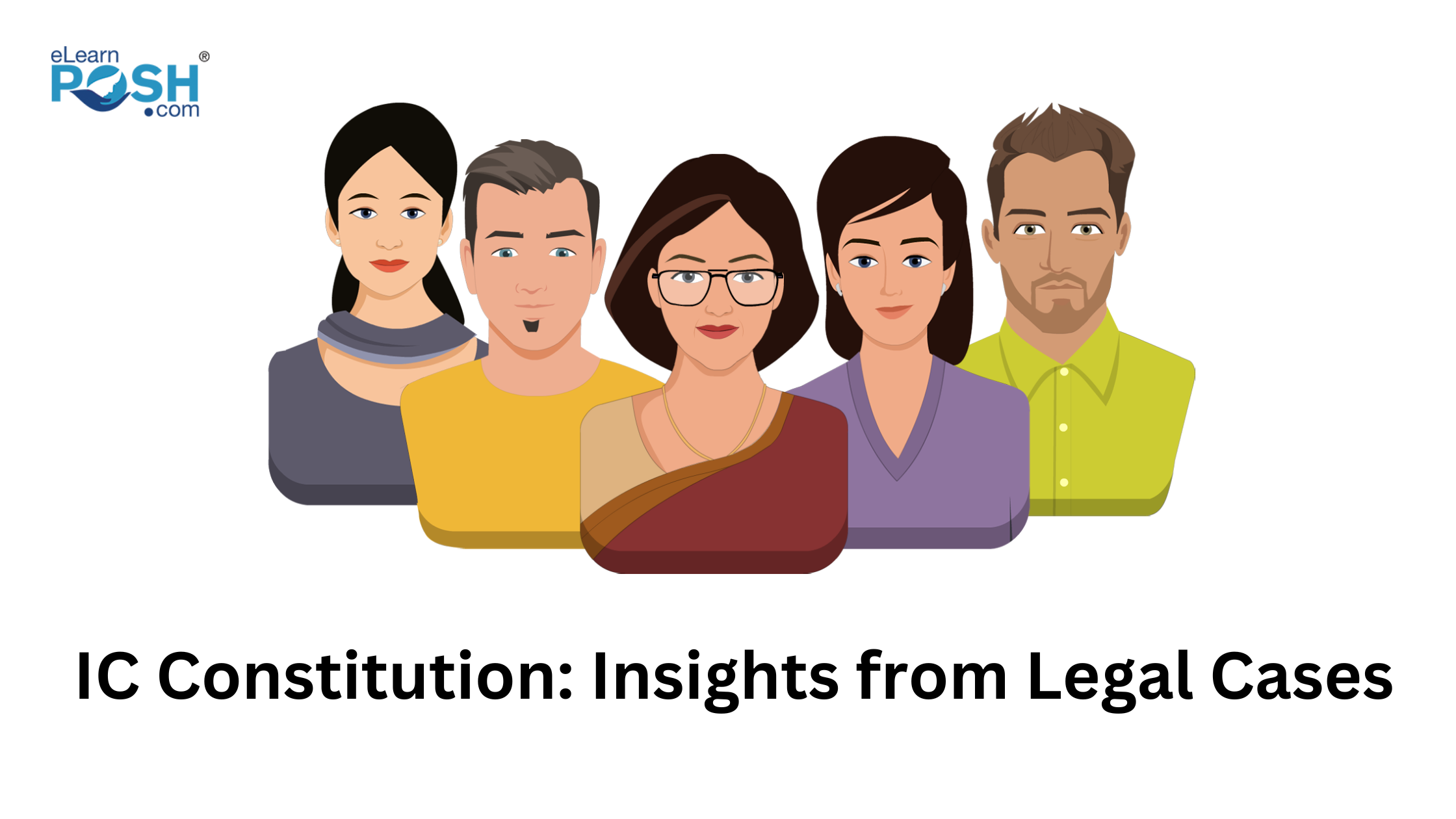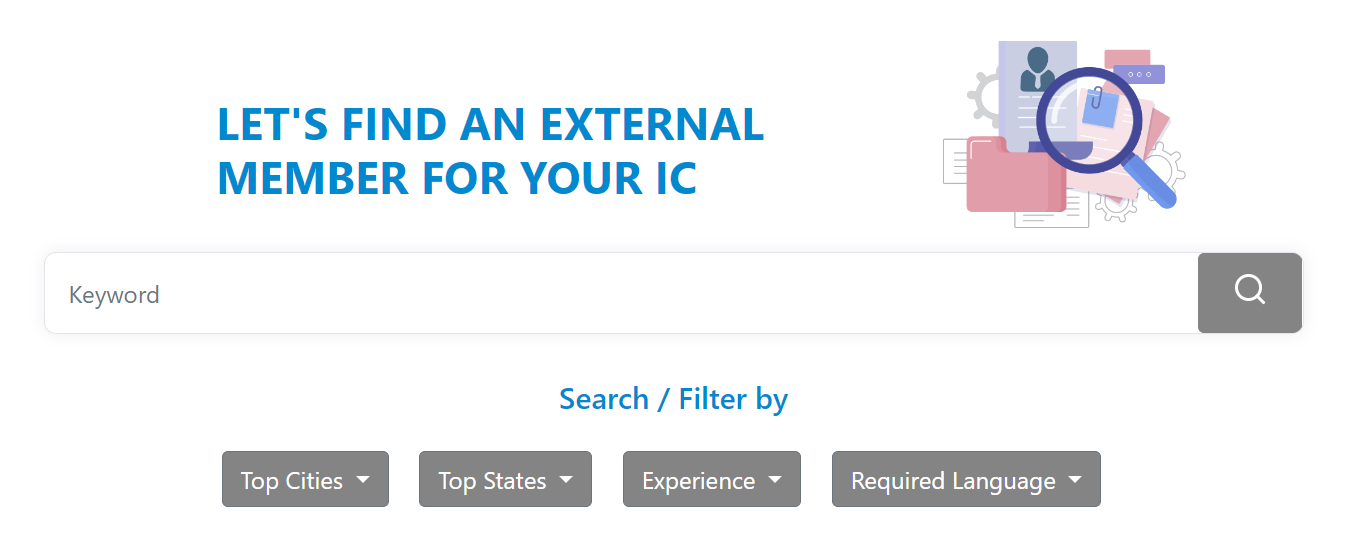 Introduction
Introduction
In the realm of workplace compliance, the Prevention of Sexual Harassment (POSH) Act, 2013, plays a pivotal role. At its core is the Internal Committee (IC), a critical component for addressing and preventing workplace harassment. This blog aims to provide a straightforward examination of the IC’s composition, offering practical insights into its role within the POSH Law.
What is the composition of the IC as per the POSH Act?
Section 4 of the POSH Act, 2013 outlines how employers must create a committee to handle and resolve complaints of sexual harassment in a structured way. This ensures a systematic approach within the organization. The POSH Act, 2013 mandates that every employer with 10 or more employees has to constitute an IC. Even if the workplace has multiple administrative units situated in different locations, it is mandatory to establish an IC in each of these administrative units. Even if there are no female employees, the organization must form an IC. This is because the POSH Law extends protection to any woman in the workplace, including clients, visitors, contractors, etc., and is not limited to female employees. Let us now understand the composition of the IC, which is structured as follows:
- The IC is led by a senior-level woman employee, who serves as the Presiding Officer;
- Two employees who are committed to the cause of women’s issues or legal knowledge;
- An external member from an NGO or association dedicated to the cause of women to provide unbiased viewpoint.
It’s important to note that the IC should have more than 50% women as its members, aligning with a commitment to gender diversity and sensitivity. Furthermore, the employer is responsible for constituting the IC, and the committee members serve for a period of three years, ensuring a continuous and accountable approach to addressing workplace sexual harassment concerns.
Let us now dive deep into the specifics of the provision.
Who is a senior-level woman employee?
The POSH Act, 2013, lacks a precise definition for the term “senior level woman employee.” However, judicial interpretations, as evidenced by case laws, offer insights into its meaning.
In the case of S. Vinukumar v. the Government of Tamil Nadu, a sexual harassment complaint led to the constitution of an IC, but the accused contested the IC’s formation, on the ground that the Presiding Officer held an equal rank as the accused. The court clarified that “senior level” doesn’t merely signify a senior officer but implies an individual working at a higher cadre than the accused. The appointment of an officer at an equivalent level was discouraged to prevent potential bias, emphasizing that the Presiding Officer should be at a higher rank than the delinquent official.
Contrastingly, the case of Shital Prasad Sharma v. The State of Rajasthan presents a different perspective. In this instance, a sexual harassment complaint led to an IC inquiry, and the accused challenged the IC’s constitution, citing that the Presiding Officer held a lower rank. The court acknowledged that the IC, formed for three years as per the POSH Act, 2013, was not specific to a single case but intended to handle all instances of sexual harassment within the organization. In this context, the court deemed it impractical to mandate a Presiding Officer to be senior to every accused, emphasizing that “senior level” doesn’t necessitate being the highest-ranking employee but someone sufficiently senior to remain unaffected by external influences. The court also highlighted in this case that while legal knowledge in an IC member is preferable, it’s not a mandatory requirement.
Both judgments emphasize the importance of avoiding prejudice and ensuring an unbiased inquiry. In instances where a new IC is constituted for a specific complaint, it’s crucial to have a Presiding Officer in a higher position than the accused, minimizing potential biases. Given practical challenges, it’s not unlawful for the Presiding Officer to be junior to the accused in certain situations, following the POSH Act’s three-year constitution provision. These insights provide a nuanced understanding of the term “senior level woman employee” and the practical considerations surrounding IC composition.
What is the role of External Member in the IC?
The role of external member in the IC is indispensable for ensuring fairness and impartiality in addressing workplace sexual harassment complaints. The external member, usually an expert in social work, women’s rights, or legal matters, brings an unbiased perspective to the IC, contributing objectivity to its discussions. This impartial stance builds confidence in the resolution process, while their diverse insights enrich the committee’s understanding of the social and legal context surrounding sexual harassment. In essence, the external member is a key contributor to transparency, ensuring a just and equitable resolution of complaints.
If you are looking for an External Member for your Internal Committee, you can check our FREE External Member Directory which has a collection of External Member profiles. If you are an External Member and would like to add your profile to our External Member Directory, you can do it for FREE here.
Why is it important for the External Member to be neutral?
In the case of Ruchika Singh Chhabra v. M/S Air France India & Anr., the complainant challenged the neutrality of the external member, asserting that the member lacked association with any NGO, as mandated by the law.
The court, in response, emphasized the rationale behind having an external member affiliated with an NGO. Having an external member from an NGO would ensure commitment to ensuring a safe work environment for women without any profit motive. The presence of such a member in the IC acts as a safeguard against potential bias or influence from senior management during proceedings.
While Section 4(2)(c) requires the IC to have one External Member from an NGO or association dedicated to the cause of women, Rule 4 of the POSH Rules specifies that the external member should be a social worker familiar with labor, service, civil, or criminal law. The court clarified that Section 4(2)(c) of the POSH Act should be read in conjunction with Rule 4 of the POSH Rules. Importantly, the court clarified that Rule 4 applies exclusively to Section 7(1)(c) of the POSH Act, dealing with Local Committees (LCs), not the IC.
In this case, Air France didn’t provide evidence supporting the external member’s experience in handling harassment cases, underscoring the need to follow statutory requirements for the IC’s composition.
Here, the External member had represented Air France in a previous legal case and this detail raised questions about the potential conflict of interest and the integrity of the IC’s proceedings. This revelation about the external member’s relationship with Air France added another layer to the complexities of ensuring a truly neutral and effective IC, as mandated by law. The Court pointed out that the proceeding of the IC should be conducted as per the principles of natural justice and one of the important principles of natural justice is “no man shall be a judge in his own cause”.
Why is it important to constitute the IC correctly?
Constituting the IC correctly is crucial for legal compliance, ensuring adherence to the POSH Act, 2013. Beyond fulfilling legal obligations, a properly formed IC is essential for conducting fair inquiries into sexual harassment complaints, fostering trust among employees. The inclusion of diverse members, like a senior-level woman employee and an external member, mitigates biases, contributing to a safe and inclusive work environment.
In the case of Sushma Alaguvadival v. The Union of India and Ors., the complainant filed a sexual harassment complaint against the accused, leading to the involvement of three different ICs. The first committee did not inquire into the matter, the second conducted a proper inquiry and found the accused guilty, while the third IC was set up by the employer due to the improper constitution of the second IC. The complainant filed a writ petition, arguing that the prolonged proceedings of the case caused her greater injustice.
The Court held that constituting a third IC was necessary as the second IC was improperly constituted. If the second IC’s report was implemented, and the accused faced consequences based on its recommendations, the accused could dispute the report due to the improper constitution of the IC, nullifying the recommendation’s purpose.
It is recommended to constitute the IC accurately from the start is crucial. It’s essential to swiftly address any deficiencies in the IC’s constitution, because an improperly formed IC may prompt challenges from the accused, compromising the inquiry’s purpose.
Conclusion
In conclusion, getting the constitution of the IC right under the POSH Act, 2013 is more than just a legal requirement; it’s the cornerstone of a safe and inclusive workplace. A carefully structured IC, with diverse members and adherence to legal norms, is vital for fair investigations and building trust among employees.
For more updates on POSH, kindly follow our LinkedIn page.
To book a personalized demo call directly with the Subject Matter Expert, you can write to sales@succeedtech.com





Leave a Reply